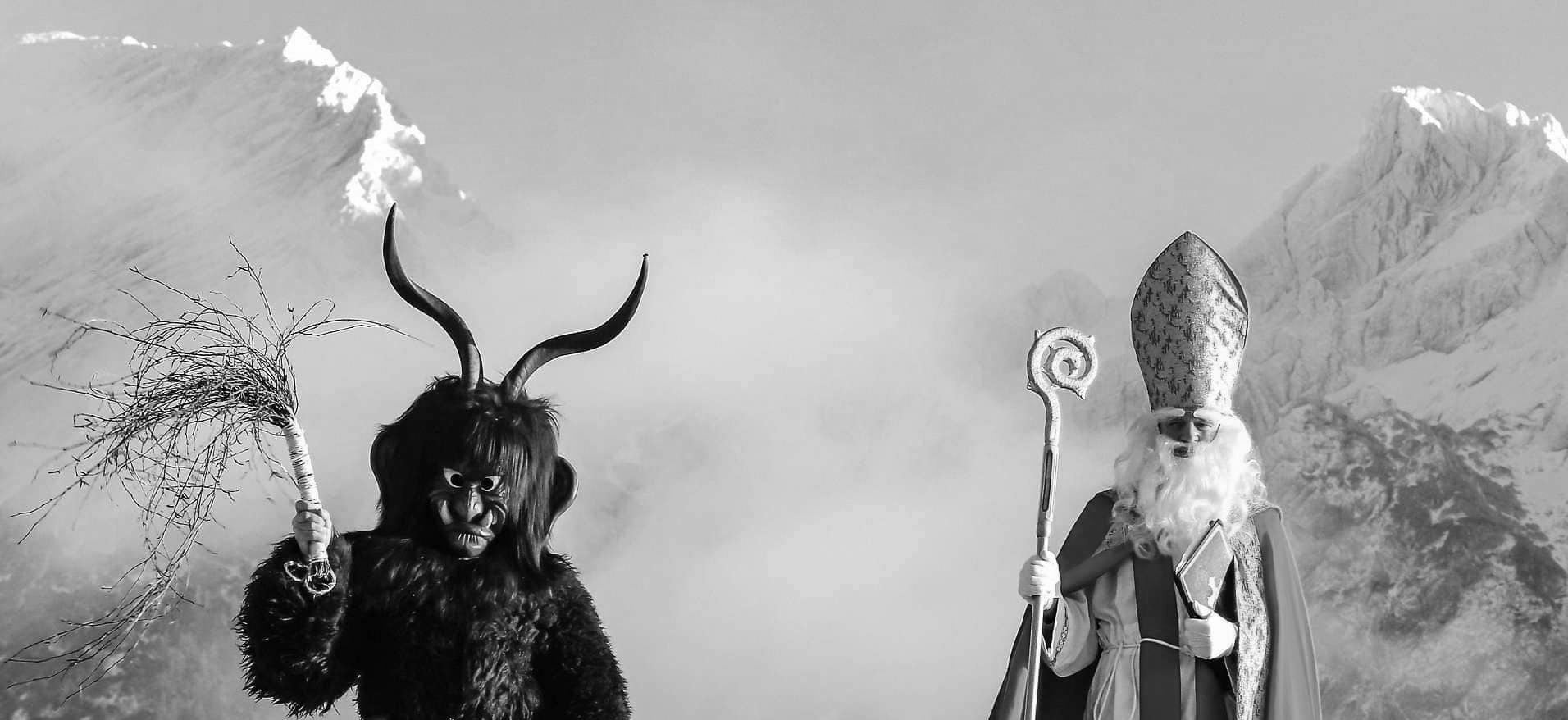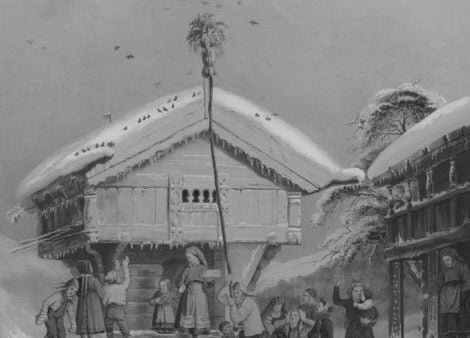At sunset, the Dolomite mountains light up in fiery red, turning to purple before fading into the night: this is the Alpenglühen, riverbero rossiccio, enrosadira or Alpenglow, a phenomenon whose origins are deeply rooted in legend. The Legend of King Laurin’s Rose Garden talks about why the mountains are sometimes glowing red and orange.
In this Article
After emerging from an extinct tropical sea around 70 million years ago, the sharp limestone peaks of the Dolomites are some of the most beautiful alpine landscapes in the world and a paradise for nature lovers. They are declared a natural World Heritage Site by UNESCO since 2009.
ETYMOLOGY: Dolomites
The Dolomites take their name from the carbonate rock ‘dolomite,’ named for French geologist Déodat de Dolomieu (1750–1801), who was the first, in the late 1700s, to describe this type of sedimentary rock, dolómia, made up of crystals of a double carbonate of magnesium and calcium (dolomite).
The name Dolomites was coined in 1792 by the Swiss naturalist H.-B. de Saussure in honor of Dolomieu. Other names are also Dolomite Mountains, Dolomite Alps or Dolomitic Alps.
In Tirolean German the mountains are called Dolomiten, in Ladin Dolomites and in Venetian Italian they are called Dolomiti and in Friulian Italian Dolomitis.
LEGENDS OF THE DOLOMITES
Can you recognize the sleeping King Laurin in the mountain shape? The head, the eye, the nose on the right, the spiky beard and his pointed shoes.

Karl Felix Wolff

Source. Fair use.
This enchanting mountain landscape, which is often times cool and forbidding, has left an indelible mark on its inhabitants. Their veritable treasure trove of myths, legends and mystery stories is an integral part of the rich cultural heritage of the Dolomites: the older generation has always passed down this heritage to a wide-eyed audience comprised of both the young and the young-at-heart.
Karl Felix Wolff (1879-1966), was probably the most prominent regional writer-explorer of legends of the Dolomites, in “Dolomitensagen” he tells the story of “King Laurin and the Rose Garden”, the legend of “The Pale Mountains” and many more.

The legend of the Pale Mountains or Dolomites
The most characteristic feature of the Dolomite rock is its bright colour. This is why the Dolomites are also called the Pale Mountains. The Ladin population, the oldest inhabitants of the mountains, have their own love story about the gleaming of the rocks.
The moon princess had to leave her prince on earth because of the dark stones and due to the melancholy that she felt for the white lunar countryside.The Salvans [A quaint, mysterious dwarf-like mountain folk] started spinning silvery moonlight and covered the rocks with a web of light. Since then the summits shone with a silvery white moonlight. Read the Legend here
“ The Catinaccio, which according to the legends was the reign of King Laurin, is joined to the Sciliar through Forcella Terrarossa. The peculiarity of this massif is that its outline changes greatly depending on which slope you are looking at: from Bozen or Bolzano it shows itself as a vast plateau with two high pinnacles, Punta Santner and Punta Euringer;

from Alpe di Siusi you can admire an imposing, compact massif with gullies, ravines and a huge scree slope with green pastures at its feet. The western slope instead is one of the best preserved tropical reefs.”
Alpenglow: Or the fire on the mountains
Rosengarten – Catinaccio from Alpe di Siusi:

Around sunrise and sunset, mountain peaks will sometimes glow red, orange, even purple, in a gorgeous display of alpine atmospherics.
Alpenglow comes from the German word Alpenglühen for “Alp glow”. In Ladin the language spoken by the ethnic minority living in the Dolomites it is called Enrosadira and in Italian riverbero rossiccio, both words refer specifically to the rosy hue of mountains after dawn and before dusk. It’s especially pronounced when mountains are snow-covered or pale and offer a blank canvas on which the light can play.
The Legend of King Laurins Rose Garden
The German name of Catinaccio is Rosengarten, which means “Garden of Roses”, a name referring to the legend of King Laurin and his Rose Garden.
King Laurin put a curse on the rose garden that had betrayed him: neither by day nor by night should a human eye ever see him again. But Laurin had forgotten the twilight, and so the rose garden blooms at sunrise and sunset.
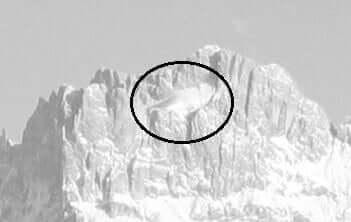
Another variant of the legend of King Laurins Rose Garden interprets the alpenglow as a reflection of the festivities in the sunken crystal castle of the dwarf king.
Another version of the legend of King Laurins Rose Garden focuses on the unfaithfulness of the people in contrast to the loyalty of the dwarfs; the rose garden here is the legacy of King Laurin’s late daughter.
According to popular tradition, the “Gartl“, a rubble between the top of the Rosengartenspitze , the Laurinswand and the Vajolet towers (the framed white spot in the photo above ), was the dwarf king’s beautiful rose garden.
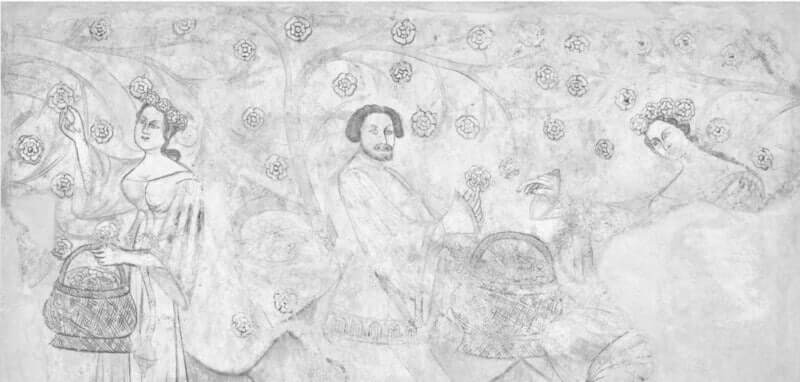
Originally Burg Lichtenberg in Prad, Vinschgau (Tyrolean Landesmuseum Ferdinandeum, Innsbruck,
Elderly Art History Collections, Inv.Nr. Gem 1447/5; Photo: Tyrolean Landesmuseum Ferdinandeum, Innsbruck).
Legend: King Laurin and the Rose garden
In the good old days, before hate and homicide existed amongst men, this chain of mountains was not as steep and bare as it now is, but easily accessible and all covered with red roses. There, in the rosegrove, lived little people with a king named Laurin. The mountain itself was hollow and in it were many corridors and halls containing immense treasures. The frontier of this mysterious and magic realm was not marked by a dam or hedge, but only by a thin thread of silk which enclosed the roses all around.
One day Laurin heard that a neighboring king had a wonderful daughter, Similde by name, and he decided to woo her. He therefore sent three of his people to that king to sue for the princess. The door-keeper who received the messengers was a wicked man whose name was Wittege. At first he would not even let them enter, but finally being obliged to do so, he said to the other soldiers:
“The impudence of these dwarf-people is unprecedented – they presume to be of equal birth with us. If I were the king I should have them beaten and throw them out.” A valiant old warrior, however, rebuked him for this speech.
In the meantime the three dwarfs had given the king their message. The king sent for his daughter and spoke with her, but the princess refused the proposal. The dwarfs became sad, and were obliged to leave the castle. Wittege was very pleased, therefore, and he scoffed at them with sneering words. The messengers, however, spoke as sharply as he did, and Wittege grew angry, and growled threateningly after them. The three dwarfs fled and told Laurin what had happened.
But the dwarf-king had a magic power which gave him great strength, and, accordingly, he succeeded in abducting Similde and in bringing her to his hollow mountain. For seven years he kept her there a prisoner. Finally the brother of the princess succeeded in discovering her whereabouts. He wanted to start with his soldiers immediately to free Similde, but Hildebrandt [hero knight] warned him, saying that King Laurin was very powerful and a terrible adversary. They decided to appeal for the help of Dietrich who was a famous warrior and lived in Bern. Dietrich [hero] instantly agreed to share the adventure.
So they marched forth. Soon, from afar, they could see Laurin’s wonderful mountain with its red roses. They thought they were very near it but the mountain was still a long way off. At last after a long journey they reached the silk thread which enclosed the rosegrove. The summer sun was shining, and under the mid-day sky the roses were glowing and exhaling in unbelievable splendour and richness.
Said the powerful Dietrich:
“Against whom shall we fight? I do not see any soldiers; neither can I see ramparts nor weapons. I only see a silken thread and I don’t like to injure it. I propose, therefore, that we send a messenger to the hollow mountain to treat with Laurin.”
These peaceful words offended Wittege. He sprang forward, tore the silken thread and trampled the roses. Immediately there appeared an armed man with a golden crown upon his head: it was King Laurin. He brandished his spear, approaching Wittege in a threatening manner.
All the warriors laughed, but Hildebrand warned Wittege to take care. But he said:
“Come along, little dwarf, I will take you by the feet and strike you against the rock wall.” But nothing of the kind happened. Both of them fought together and soon Wittege was in such distress that he was obliged to call for Dietrich’s help. Then Dietrich hurried up and Hildebrand cried to him:
“Laurin is wearing a belt which gives him the strength of twelve men; tear off this belt and victory will be yours.”
Dietrich did so, and soon he succeeded in overcoming the dwarf. Immediately Similde’s brother came up and demanded the princess.
“She is in my mountain, answered Laurin, and she has apartments and servants. No harm has been done to her: of that you may be sure.
“Conduct me to her and let her go free”, cried the warrior, “or I shall cut off your head.”
Now Dietrich would not allow such angry word ‘ s to be addressed to little Laurin, and the warriors, therefore, began to quarrel. All at once there opened in the rocks a gate which nobody had noticed until that moment, and Similde came out with a troop of servants. She was delighted to see her brother and thanked him and the other gentlemen for her release, saying at the same time that Laurin was a noble man for he had always honoured her like a queen. The gentlemen, therefore, she said, should not be angry with him nor continue to make war upon him, but become friends.
The powerful Dietrich liked this speech. He gave Laurin his hand and invited the other warriors to follow his example. They all did so except Wittege. He said goodbye and went away.
Then Laurin said:
“As we are all friends now, come with me into the mountain; there I will show you my treasures and entertain you well.”
The warriors accepted the invitation with pleasure and entered the hollow mountain. They were soon lost in admiration at all the beauties that were hidden there. The realm of the dwarfs contained wonderful treasures and works of art. Finally they came to a large hall where Laurin and his guests took their places at a richly laden banquet-table. They were served by dwarfs and entertained with music and song. The hours passed quickly and it became night. Laurin rose from the table and conducted the guests to their rooms. All retired to rest.
Shortly after midnight Laurin was awakened by a shield bearer who told him that Wittege was creeping around, the rosegrove with a troop of armed men trying to break into the hollow mountain. Immediately Laurin marched out with his people and after strenuous fights Wittege and his soldiers were driven down the mountain. Victorious, the dwarfs returned home in need of rest.
Hildebrand, however, had heard the noise of the fight, and fearing treason he awakened his companions. They armed themselves and occupied the gates. On seeing this Laurin thought that his guests and Wittege had secretly agreed to attack the dwarf people suddenly during the night and to destroy them. They reproached each other in a very offensive manner and soon a very sharp fight had started again. Obeying Laurin’s instructions the dwarfs put on caps which made them invisible. Thanks to this advantage, they succeeded in overpowering the warriors and in putting them in chains. Then they put them all together into a deep keep, closed the gate and went to sleep.
But the powerful Dietrich grew so angry that fire came from his mouth and with it, he melted, away the chains, freeing himself and his companions. As soon as they were free, Similde appeared, bringing them magic rings by means of which the efficacy of the caps was set at nought.
The dwarfs awakened and began an assault. Although they were wearing their magic caps again, they were now seen by the warriors and resisted. Soon the dwarfs were at a disadvantage, Laurin sent for five giants who lived on a neighboring mountain.
They came and helped him yet the victory went to the powerful Dietrich and his companions. They took Laurin prisoner and dragged him away with them to a lonely farm where Wittege was his guard.
Thus Laurin lost everything and fell into great misfortune. The servants mocked at him and he was ill-treated by Wittege. He was often bound to a pillar and obliged to sing and dance while the troops looked on and laughed. Laurin suffered in this way for many years.
One night, however, it happened that Wittege and another warrior had to keep night-watch. They played with dice on a drum and were drinking beer from large bumpers. In this way they did not pay much attention to Laurin as they had bound him to a stake with a leather rope. But as it was very cold they made a fire, and continuing to drink, they fell asleep in the morning beside the drum. Laurin succeeded in reaching the fire-place and in burning the leather rope in the glowing ashes.
Thus he freed himself and fled.
After long travelling Laurin arrived back to his mountains, but on turning a corner of the valley and seeing all at once the red Rosegarden, standing like a miracle above the forests before him, he said:
“These roses have betrayed me. If the men had not seen the roses, they would never have discovered my mountain.”
Thereupon Laurin turned the whole Rosegarden into stone, pronouncing a spell to the effect that roses were never to be seen there again either by night or by day.
But he forgot the twilight, which is neither night nor day, and that is why the enchanted garden displays its roses at twilight.
This is called A I p g I o w. At this time men come out of their houses to watch and wonder, and they become imbued with the spirit of the good old times when hate and homicide did not exist and everything was more beautiful and good.
But when the Rosegarden has died away and its peaks stand out once more in cold clearness, then men become silent and return sadly to their homes.
So tells the old story of the Rosegarden which was enclosed by a silken thread, about Wittege’s might and the sorrow of Laurin.
~ Karl Felix Wolff. Legends of the Dolomites.
LADIN: Re Laurin
Re Laurin
Dër dadî êl tles Dolomites n beliscim rëgn, plëgn de röses y rich de tesurs y de peres prezioses. I confins n’ê nia marcá da mürs o da foritficaziuns, mo mâ da n fí de sëda dër sotí.
Chësc rëgn, ciamò al dédaincö tlamè “urt dles röses”, ê abité da n popul de zbergli y le re Laurin regnâ sura de ël cun gran bravöra y cun forzes misterioses. Mo deache le re ê inamoré dla bela Similda, la fia dl vedl eroe Hildebrand, âl n dé menè sü ambasciadus tl rëgn vijin a ti damanè la man. I trëi zbergli â azetè la misciun y ê piá ía. Canche ia ê rová al ćiastel, ne n’êsi nia gnüs tuć íte cun ligrëza, mo le capo dles vêrdies, n cer Wittich, i ofenô y ne n’orô nia i lascè passè inant. Mo le re Hildebrand, che ê na porsona dër sapiënta y de bun cor, â atira fat tó post i trëi ambasciadus tl salf dl tronn, olache ai ti â spo portè dant ala prinzëssa l’intenziun dl re. Zënza che ëi ne s’l’ess mai aspetada, â la prinzëssa Similda atira dit de no y ara ne se lasciâ gnanca baié sö. Cun la ria se n’ê spo i trëi zbergli indô piá demez por jí a informé le re dla burta noela. Da passè fòra i mürs dl ciastel ê i trëi indô saltá te Wittich, che n’â sambëgn aprofité por i coiené danü: i trëi, inće ëi nia stleć de müsa, ti les dijô zeruch y le fajô cöje dal sënn. Wittich ti â sön chëra impormetü che al i ess vendiché; en chë nöt ćiamò ti êl jü dô y nen á copè un. I dui che ê sta bugn de se salvé, ti â spo döt cunté a re Laurin.Y deache le re di zbergli conesciô inće l’ êrt dl striné, s’âl impò spo tut la bela Similda y l’â condüta te sò rëgn dla munt. Al la tratâ sciöche na regina. Tl ćiastel de Hildebrand n’él rové por tröc agn alalungia gnanca la plü picia notizia dla prinzëssa. Mo n dé ê le fre dla prinzëssa gnü al savëi le post, olache süa só gnô tignida prijoníera y al ess ion orü la deliberé. Le vedl pere che ti recordâ tres indô la forza y la potënza de re Laurin ti aconsiâ de damanè aiüt a Teoderich da Verona. Ara n’â insciö nia doré dî che trami eserć marsciâ bele devers dles Dolomites. A chësta spediziun â inće tut pert Wittich. Dô le iade lunch ê i ererć spo finalamënter rová dlungia le fi de sëda che marcâ l’estenjiun dl “urt dles röses”.
Wittich â trat ía le fí y â metü man da ćiarpedè jö y da rumpí les röses cöcenes y profumades. Te n iade êl spo comparí ilò inanter i ciüfs n mandl cun na lanza tla man y cun na corona d’or söl će, fornida de diamanć, safirs y rubins: al ê le re Laurin. Le cheder che se presentâ ê plütosc grotesch y i soldas ne n’ê nai bugn da se tigní le ri. Wittich â spo atira azetè la sfida dl zbergl y ara ne n’â nia doré dî, che la situaziun ê na desperada. Mâ cun l’aiüt de Teoderich â le re Laurin podü gní batü. Mo pornanche Teoderich â odü tan mal che le re di zbergli gnô traté, s’âl dessenè y inanter i dui eserć, daimpröma unis, rompî l śëgn fòra na gran descordia. Mâ tres l’interzesciun dla prinzëssa Similda êl indô sté meso de restabilí l’òrdin y de portè la pêsc inanter i soldas y re Laurin. Düć se dô sciöche sëgn d’amizizia la man, mo le soldá Wittich ê tan dessenè che al se tignî da na pert. L re di zbergli â spo inivié i nüs amisc a na vijita te sò rëgn. Düc ti ćiarâ incantá ales belëzes y ales peres prezioses. Döta la sera fajôi festa, ai ćiantâ y balâ ćina tert tla nöt y jô spo a durmí. Mo le pice re ne n ê nia bun de durmí en pêsc. Intratant êl rové adalerch Wittich a cé de n esert de fedei cun l’intenziun de copé le re Laurin. Le combatimënt ê sté cört mo cröde y Wittich â pördü. Por gauja dla gran confujion s’êl inće descedè i soldas de Hildebrand y de Teoderich. Cun les ermes tla man êsi saltá fòra de ćiastel a ödei ći che al sozedô, rovan insciö amesa n gran combatimënt: degügn n’â albü tëmp por dè na spligaziun y por la gran tëma de n tradimënt da öna oa dal’altra pert, êl spo rot fòra na batalia infernala. La vera s’â trat fòra por dis alalungia zënza che valgügn ess davagné o pordü. Ala fin â pordü le re Laurin y al gnô fat prijoníer. I dis ê lunć y burć por le püre re, y chësc tandeplü, deache danter les vêrdies dla porjun êl inće le cröde Wittich. Al passâ mëisc y agn. Mo na nöt n’â re Laurin aprofité de n momënt de destraziun dles vêrdies y ê stè bun de s’un sciampé. Canche al ê rové söl confin cun sò rëgn y odô indô le bel urt de röses profumades, ti gnôl da pité dala gran ligrëza. Al ti â ćiarè ales röses por l’ultima ota por les trasformè spo cun n strinët te crëps stlauris.
A recordanza dl re Laurin podunse nos nes gode da chël dé inant al florí de söredl por püć momënć n framënt de belëza de chë tera magica tlamada poeticamënter “urt dles röses”.
AA.VV.: Les plü beles liëndes de Südtirol. Le più belle leggende dell’Alto Adige. Die schönsten Südtiroler Sagen. Uniun Ladins Val Badia, 1993.
DEUTSCH: König Laurin und sein Rosengarten
König Laurin und sein Rosengarten
Hoch oben in den grauen Felsen des Rosengartens, dort, wo sich heute nur mehr eine öde Geröllhalde, das “Gartl”, ausbreitet, lag einst König Laurins Rosengarten.
König Laurin war der Herrscher über ein zahlreiches Zwergenvolk, das dort in den Bergen nach edlem Gestein und wertvollen Erzen suchte, und besaß einen unterirdischen Palast aus funkelndem Bergkristall. Seine besondere Freude und sein Stolz aber war der große Garten vor dem Eingang zu seiner unterirdischen Kristallburg, in dem unzählige edle Rosen blühten und dufteten. Wehe aber dem, der es gewagt hätte, auch nur eine dieser Rosen zu pflücken: ihm hätte Laurin die linke Hand und den rechten Fuß genommen! Dieselbe Strafe wäre auch dem widerfahren, der den Seidenfaden zerrissen hätte, der den ganzen Rosengarten anstatt eines Zaunes umspannte.
Im Kampfe vermochte es der Zwergenkönig mit jedermann, auch dem stärksten Recken, aufzunehmen. Denn er besaß nicht nur einen Zaubergürtel, der ihm die Kraft und Stärke von zwölf Männern verlieh, sondern auch eine geheimnisvolle Tarnkappe, die ihn unsichtbar machte, wenn er sie aufsetzte.
So herrlich nun Garten und Palast des Zwergenkönigs auch gewesen sind, so fehlte ihm doch eines: eine Braut. Und als er darum hörte, daß der König an der Etsch gedenke, seine schöne Tochter Similde zu verheiraten, und eine Maifahrt ausrufen ließ, zu der sich alle Freier einfinden sollten, da freute sich Laurin und beschloß, die Einladung des Königs an der Etsch anzunehmen und auch um Similde zu werben.
Doch Tag um Tag verstrich, ohne daß ein Bote des Königs an der Etsch zu Laurin kam, um auch ihm die Einladung zu der großen Maifahrt zu überbringen. Das verdroß den Zwergenkönig, und so beschloß er denn, an dieser Maifahrt nur im geheimen teilzunehmen – indem er sich nämlich durch seine Tarnkappe unsichtbar machte.
Auf einem großen Rasenplatz vor dem Schloß des Königs an der Etsch fanden die Kampfspiele statt, an denen sich die Freier um Similde zu beteiligen hatten. Wer sich in diesen Wettspielen am meisten im Fechten und Reiten bewährt haben würde und also zuletzt als Sieger hervorging, dem wollte der König an der Etsch Similde als Maibraut anvermählen.
Sieben Tage lang dauerten die Kampfspiele, dann waren endlich die beiden Recken ermittelt, die in einem abschließenden und alles entscheidenden Wettspiel um die Hand der schönen Similde kämpfen sollten. Es waren dies Hartwig, der in seinem Schilde eine Lilie führte, und Wittich, der eine Schlange als Erkennungszeichen hatte.
Lange wogte der Kampf zwischen den beiden tapferen Recken hin und her, und es nahte schon der Sonnenuntergang, wo der Wettkampf beendet werden sollte. Doch ehe der König das Zeichen zum Aufhören geben und einen der beiden Recken zum Sieger erklären konnte, entstand auf einmal Lärm, und Stimmen schrien durcheinander: Similde ist verschwunden! Similde ist geraubt worden!
Aber als das Verschwinden der Königstochter bemerkt wurde, ritt Laurin mit Similde schon davon und konnte nicht mehr aufgehalten werden, zumal er seine Tarnkappe aufhatte und darum nicht nur er selbst, sondern auch sein Pferd und die geraubte Königstochter unsichtbar waren!
Laurin hatte im geheimen den Kampfspielen beigewohnt, und das holde Wesen der schönen Königstochter und ihr liebliches Antlitz hatten ihn je länger, desto mehr so gefangen, daß er endlich beschloß, den Ausgang des Kampfes nicht abzuwarten, wo Similde dem einen von beiden anvermählt würde, sondern die schöne Braut zu rauben und sie in sein Felsenreich zu entführen.
Hartwig und Wittich aber beschlossen, diese Schmach nicht hinzunehmen und dem Zwergenkönig Laurin – denn nur dieser konnte Similde geraubt haben, das wußte man sogleich – die entführte Königstochter wieder abzunehmen.
Doch sie wußten wohl, daß dies ein schweres Unterfangen sein werde, besaß ja Laurin einen Zwölfmännergürtel und eine Tarn- oder Nebelkappe und überdies viele tausend Zwerge, die gewiß für ihren König zu kämpfen bereit waren.
Und so wandten sie sich an den großen und berühmten Fürsten Dietrich von Bern und baten ihn um seine Hilfe. Dieser sagte zu, wie wohl sein alter Waffenmeister Hildebrand ihn warnte und auf die geheimnisvollen Kräfte des Zwergenkönigs hinwies.
So machten sie sich denn auf die Reise nach der Felsenburg des Zwergenfürsten: Dietrich von Bern, Hildebrand, Hartwig und Wittich, Wolfhart und noch andere tapfere Recken.
Als sie endlich vor dem herrlichen Rosengarten des Königs Laurin ankamen und die Fülle dieser Blütenpracht gewahrten, da staunten Dietrich und seine Gefährten – und sie beschlossen, den zarten Seidenfaden nicht zu zerreißen und den König herbeizurufen, um mit ihm gütlich zu unterhandeln, daß er ihnen Similde herausgeben solle, die er geraubt hatte.
Doch Wittich, der Ritter mit der Schlange im Schilde, sprang, von Ungeduld gepackt, vorwärts, zerriß den Seidenfaden und zertrat die nächsten Rosen.
Da ritt schon König Laurin auf seinem Schimmelpferdchen daher, eine kleine goldene Krone auf dem Haupte und ein glänzendes Schwert in der Rechten, kam auf Wittich zu und forderte seine Hand und seinen Fuß. Doch Wittich höhnte nur, als er den kleinen Reiter sah, und sagte: “Komm nur her, Zwerglein, ich nehme dich gleich bei den Füßen und werfe dich an die Felsenwand!”
Aber ehe er sich’s versah, hatte ihn Laurin, der den Zwölfmännergürtel trug, überwältigt und wollte ihm also gleich Hand und Fuß abhacken! Dies aber konnte Dietrich von Bern nicht zulassen und eilte darum auf Laurin zu, um ihn an der Ausführung dieser furchtbaren Strafe zu hindern.
Laurin aber stieß Dietrich weg. So nahmen die beiden Könige den Zweikampf auf – der kleine Fürst des Zwergenreiches und der hünenhafte Recke aus Bern!
Mit der ganzen Zwölfmännerkraft, die ihm sein Zaubergürtel verlieh, hieb der Zwergenkönig auf den Berner ein und verwundete ihn mehrmals. Dies reizte den starken Berner, und er begann auch Laurin mit seinen Schwertstreichen nicht mehr zu schonen.
So kämpften die beiden Könige eine Weile wacker miteinander, und die Begleiter Dietrichs staunten über die Kraft und Behendigkeit des kleinen Fürsten, der sich von Dietrich nicht überwinden lassen wollte.
Da aber setzte sich Laurin auf einmal die Tarnkappe auf und war nun unsichtbar geworden! Damit war er im Vorteil: Er traf seinen Gegner mit jedem Hiebe, Dietrich von Bern aber konnte nur mehr blindlings um sich schlagen.
Da rief Hildebrand, der alte Waffenmeister: “Zerreiß ihm den Gürtel!” Dies aber war leichter gesagt als getan, denn Dietrich konnte ja den Zwergenkönig nicht sehen und also ergreifen. Da kam Hildebrand der rettende Gedanke: “Achte auf die Bewegungen des Grases, dann wirst du sehen, wo der Zwerg steht!”
Als Dietrich von Bern dies tat, konnte er sehen, wo Laurin gerade stand, er eilte auf ihn zu, packte ihn um die Mitte und zerbrach ihm den Gürtel. Dieser fiel zu Boden und Hildebrand nahm ihn an sich.
Nun war der Kampf rasch entschieden, und die Zwerge begannen zu heulen, als sie ihren König besiegt und in der Gewalt des Berners sahen, der ihm auch die Tarnkappe und alle Waffen abnahm.
Ehe aber Dietrich und seine Begleiter beschließen konnten, was mit dem besiegten Zwergenkönig zu geschehen habe, da öffnete sich im Felsen ein Tor, das vorher niemand bemerkt hatte, und Similde trat heraus mit einer Schar von Dienerinnen. Sie dankte Dietrich und den anderen Herren für ihre Befreiung, bemerkte aber auch zugleich, daß Laurin sie immer gut behandelt und wie eine Königin geehrt habe. Die Herren sollten ihm darum nicht gram sein und ihn nicht weiter befehden, sondern mit ihm Frieden und Freundschaft schließen.
Diese Rede gefiel dem starken Dietrich, und er reichte Laurin die Hand zum Frieden. Laurin nahm die Hand an und lud Dietrich und alle seine Begleiter in sein unterirdisches Felsenschloß: “Ich will euch meine Schätze zeigen und euch wohl bewirten.”
Die Recken nahmen die Einladung an und betraten den hohlen Berg. Wie staunten sie, als sie die reichen Schätze des Zwergenfürsten sahen! Endlich gelangten sie in einen großen Saal, wo sich Laurin mit seinen Gästen an einer reich geschmückten Tafel zum Mahle niederließ.
Da wurden sie nun von den Zwergen aufs beste bewirtet und mit Gesang und Spiel erfreut. Doch zu vorgerückter Stunde, als sie sich etwas Derartiges nicht mehr erwarteten, wurden die Recken plötzlich von den Zwergen überfallen, in Ketten gelegt und in ein festes Gewölbe geschleppt und dort eingeschlossen.
Dieser Verrat ergrimmte Dietrich und seine Begleiter, und sie schworen dem hinterlistigen Zwergenkönig Rache. Der Zorn gab dem Berner doppelte Kräfte, und so gelang es ihm endlich, die Ketten zu zerreißen und sich und seine Gefährten zu befreien. Sie zerbrachen die Türen ihres Gefängnisses, überwanden die anstürmenden Zwerge und nahmen endlich auch den König Laurin gefangen.
Hartwig, der Ritter mit der Lilie, brachte Similde aus dem Berg, holte sein Roß herbei, setzte die Königstochter zu sich in den Sattel und ritt mit ihr heimzu, zur Burg ihres Vaters, des Königs an der Etsch. Dieser freute sich über die Rückkehr seiner entführten Tochter und ging den beiden, die da Hand in Hand auf ihn zukamen, entgegen und vermählte sie.
Dietrich und die anderen Recken aber ritten wieder nach Bern zurück. Doch den heimtückischen Zwergenkönig, der sein Friedenswort gebrochen hatte, nahmen sie mit, um ihn am Hof zu Bern gefangenzuhalten.
Er sollte nie wieder seine Felsenburg sehen können. Als er, gekettet und als Gefangener, sein Felsenreich verlassen mußte, da sprach er: “Diese Rosen haben mich verraten; hätten die Recken nicht die Rosen gesehen, so wären sie nie auf meinen Berg gekommen!” Und er verfluchte den ganzen Rosengarten und die Rosen und sprach einen Zauberbann über sie, daß sie fortan keiner mehr sehen solle, weder bei Tag noch bei Nacht. Dann verließ Laurin bitteren Herzens sein Felsenreich und zog mit den Recken nach Bern, um dort sein Leben als Gefangener zu beschließen.
Doch er hatte bei seinem Fluche die Dämmerung vergessen! Und so kommt es, daß der verzauberte Rosengarten noch oft in der Dämmerung seine Rosenpracht zeigt und daß der ganze Berg über und über im Rosenschimmer erstrahlt und so die Erinnerung wachhält, an den unglücklichen König Laurin und seinen Rosengarten.
Quelle: Bruno Mahlknecht, Südtiroler Sagen, Bozen 1981. S. 121. Frei nach K. F. Wolff, König Laurin und sein Rosengarten, Bozen 1945 und Dolomiten-Sagen, Innsbruck 1977.
ITALIANO: La leggenda del Rosengarten
La leggenda del Rosengarten
Tutti sanno che le vette delle Dolomiti si tingono, al crepuscolo, di un bellissimo color di rosa: strano riflesso luminoso, che dura pochi momenti e si spegne quasi d’un tratto. Alpenglühen lo chiamano i tedeschi, e i ladini Enrosadira. Questa fugace apparizione di luce rosata ha in ogni tempo eccitato la fantasia dei montanari; e alla montagna dove essa è più bella e più viva i tedeschi hanno dato il nome di giardino delle rose (Rosengarten), La storia del giardino delle rose ci è narrata da una vecchia leggenda, nella quale si confondono elementi germanici e reto-ladini.
Nel buon tempo antico, quando gli uomini non si odiavano né si uccidevano fra loro, la grande montagna che si vede a levante di Bolzano non era, come ora, aspra e nuda: era anzi facile e dolce, e tutta mirabilmente fiorita di rose rosse. Fra le rose abitava un popolo di Nani, sul quale regnava, amato sovrano, re Laurino. Nell’interno del monte erano scavati lunghi corridoi e grandi sale, che racchiudevano tesori favolosi. Non mura e non palizzate difendevano l’accesso di questo incantevole regno: soltanto un filo sottile di seta ne tracciava tutt’intorno il confine.
Un giorno Laurino venne a sapere che un re suo vicino aveva una figlia di mirabile bellezza, e decise di domandarla in isposa. Tre Nani ambasciatori partirono per chiedere la mano della principessa Similda. Arrivati che furono al castello reale, il soldato di guardia alla porta, Vitege, non voleva lasciarli passare: costretto a farlo, aprì con mala grazia e disse ai suoi compagni:
— È senza esempio la sfacciataggine di questi Nani: si considerano nostri pari. Se fossi il re, li farei bastonare e mettere alla porta, questi ambasciatori da ridere.
Ma il vecchio eroe Ildebrando, saviamente lo fece tacere.
Intanto i tre Nani esponevano al re il loro messaggio. Il re li accolse cortesemente, ma la principessa, interrogata, respinse la proposta; e i tre piccoli ambasciatori dovettero lasciare il castello, rattristati d’esser costretti a portare un rifiuto al loro sovrano.
Se ne rallegrò il cattivo Vitege, e gridò loro parole di scherno. Ma i Nani, che eran pronti di lingua, risposero per le rime: Vitege, furioso, appena si fece buio li insegui, li raggiunse in un bosco a mezza strada e uccise uno di loro. Gli altri due fuggirono e corsero a raccontare l’accaduto a re Laurino.
Il re dei Nani era anche un incantatore potente: con le sue arti magiche riuscì a rapire Similda e a condurla nel cavo della sua montagna. E per sette anni la tenne prigioniera, senza che i famigliari di lei riuscissero ad averne alcuna notizia.
Passati sette anni, il fratello di Similda scoprì il luogo dove la bella principessa era rinchiusa. Subito voleva partire con i suoi uomini per liberarla; ma Ildebrando, il vecchio guerriero, lo ammonì che re Laurino era un avversario troppo forte perché egli potesse vincerlo da solo; e, dietro suo consiglio, il principe decise di chiedere aiuto a Teodorico da Verona, l’eroe famoso. Teodorico si dichiarò pronto ad assumere l’impresa. Partirono, accompagnati da Vitege e altri guerrieri, e presto giunsero in vista della montagna coperta di rose: pareva loro d’esser già molto vicini, ma soltanto dopo lungo cammino arrivarono al filo di seta che cingeva l’immenso roseto. Era mezzogiorno. Sotto il caldo sole d’estate fiorivano le rose, meravigliosamente rosse e profumate. Disse allora il forte Teodorico:
— Contro chi devo combattere? Non vedo guerrieri, né mura, né difese: vedo soltanto un filo di seta, che io non posso né voglio violare. Vi propongo di mandare un messo a trattare con re Laurino.
Queste parole di pace irritarono Vitege; violento, balzò avanti, strappò il filo e calpestò le rose. Immediatamente, tra i fiori schiantati e sfogliati, comparve un omettino armato da capo a piedi, che aveva sul capo una corona d’oro. Era Laurino, il re dei nani: brandiva una piccola lancia e si volgeva minaccioso contro Vitege. Tutti i cavalieri del giovane principe risero; solo non rise Ildebrando, che gridò a Vitege di guardarsi. Ma Vitege disse allegramente:
— Vieni, vieni qui, nanerottolo, che io ti prenda per i piedi e ti sbatta contro la roccia.
Le cose però non andarono proprio come Vitege credeva: i due avversari lottarono e in breve Vitege si trovò così a mal partito che dovette chiamare in aiuto Teodorico. Teodorico accorse e Ildebrando gli gridò dietro:
— Laurino ha una cintura che gli dà la forza di dodici uomini; strappagliela e la vittoria sarà tua.
Teodorico seguì il buon consiglio e in un momento ebbe vinto il Nano. Allora si avanzò il fratello di Similda e domandò conto della principessa.
— Similda sta nella mia montagna, rispose Laurino. Ha grandi sale per abitare e dame per servirla; nessun male le è stato fatto, siatene sicuro.
— Conducimi da lei e mettila immediatamente in libertà, gridò il cavaliere, se non vuoi che ti tagli la testa.
Ma Teodorico, l’eroe, non tollerò che si parlasse così duramente al piccolo Laurino, e ne fece rimprovero a Vitege ed al giovane principe. I cavalieri presero parte chi per Vitege e chi per Teodorico, e vennero alle mani fra loro. Allora si aprì nella roccia una porta, che nessuno prima di quel momento aveva veduta, e ne uscì Similda, seguita dalla schiera delle sue donne. La principessa si rallegrò di rivedere il fratello, e ringraziò lui e i compagni di averla liberata; ma aggiunse che Laurino era buono e leale, che l’aveva sempre onorata come una regina: ora essi dovevano stringere amicizia con lui e non più combatterlo né essergli ostili.
Piacquero queste parole al forte Teodorico; porse la mano a Laurino e impose agli altri guerrieri di seguire il suo esempio. Tutti lo fecero, ad eccezione di Vitege, il quale salutò bruscamente e si allontanò adirato.
Re Laurino disse:
— Ora che siamo amici, entrate nella mia montagna; voglio mostrarvi i miei tesori e darvi ospitalità.
I cavalieri accettarono volentieri l’invito cortese e seguirono Laurino nell’interno del monte. Ai loro occhi stupiti apparvero mirabili cose: il regno dei Nani conteneva tesori inestimabili e opere d’arte di molto pregio. In una grande sala una tavola ricchissima era preparata per gli ospiti, e i Nani con canti e con danze rallegrarono il convito. così passarono lietamente le ore, fino a notte. Allora re Laurino fece togliere le mense e condusse gli ospiti a riposare; e in breve tutto il regno dei Nani fu addormentato.
Ma la mezzanotte era appena scoccata quando un Nano corse ad avvertire il re che Vitege, con una schiera di armati, saliva cautamente fra le rose, per tentar di sorprendere i Nani nel sonno. Seguito dai suoi, re Laurino si slanciò fuori dalla sua dimora sotterranea, e dopo una breve violenta lotta Vitege e i suoi furono ricacciati giù per la montagna. I Nani, vincitori, ripresero la via di casa, non pensando ad altro che a riprendere il sonno interrotto.
Ma intanto il vecchio Ildebrando, udito il rumore della battaglia, aveva destato i suoi gridando al tradimento. In men che non si dica tutti furono armati e occuparono le porte.
Ora accadde che quando Laurino tornò dal combattimento, trovando i suoi ospiti desti ed in armi, credette che fra essi e Vitege vi fosse stata una perfida intesa, e assalì i cavalieri con amari rimproveri. così si venne di nuovo alle armi e la lotta questa volta fu terribile. A un cenno di Laurino, i Nani indossarono cappe che li rendevano invisibili, e riuscirono così a vincere i loro più forti avversari. Li avvinsero con catene, li chiusero in un sotterraneo e tornarono a dormire.
Ma Teodorico, l’eroe, fu preso da tale furore, che dalla bocca gli uscirono fiamme. Con quel fuoco fuse le sue catene, e una volta libero poté sciogliere i compagni dalle loro. Intanto Similda veniva in segreto alla prigione, portando per ciascuno un anello magico, che rendeva nullo il potere delle cappe; così che quando i Nani, assaliti d’improvviso, ricorsero ad esse, sicuri di rendersi invisibili, furono ridotti a mal partito dai guerrieri che, grazie agli anelli fatati, li vedevano perfettamente. Re Laurino, sentendosi perduto, mandò a chiamare in fretta cinque Giganti, che abitavano sopra una montagna vicina, e che arrivarono in un momento in aiuto dei loro minuscoli amici. Si riaccese più terribile la lotta: ma il forte Teodorico e i suoi compagni furono questa volta vincitori e condussero via, prigioniero, re Laurino. Lo chiusero in una vecchia casa solitaria e gli diedero Vitege per custode.
Così Laurino aveva perduto il regno ed era ridotto nelle più misere condizioni. Vitege lo maltrattava, i soldati addetti alla sua sorveglianza lo schernivano: spesso lo legavano con una lunga corda a un palo e lo costringevano a cantare e ballare per divertire gli uomini d’arme, che si ridevano di lui.
La dura prigionia di re Laurino durò molti anni.
Una sera d’inverno Vitege e un altro soldato erano di guardia presso l’infelice re dei Nani. Giocavano ai dadi sopra un tamburo e bevevano grandi boccali di birra, senza darsi pensiero di Laurino, che avevan legato al palo con una corda di cuoio. Per scaldarsi, avevano acceso un gran fuoco: e sia per la birra bevuta, sia per il buon tepore diffuso dalla fiamma, poco prima dell’alba si lasciaron prendere dal sonno. Laurino allora si accostò al focolare; e tenne sulla cenere ardente la corda di cuoio finché non fu consumata. Liberato dai legami, fuggì dalla prigione senza esser visto da nessuno. Dopo lungo cammino giunse fra le sue montagne. Ma quando, a una svolta della valle, gli apparve il bel giardino di rose, rosso, splendente al disopra dei boschi, re Laurino si disse:
— Son le rose che mi hanno tradito. Se gli uomini,, non le avessero viste, non avrebbero mai scoperto il mio regno.
E, per renderlo invisibile, Laurino trasformò in pietra tutto il roseto e fece un incantesimo, che le rose non potessero vedersi né di giorno né di notte.
Ma nell’incantesimo il re Nano aveva dimenticato il crepuscolo, che non è giorno e non è notte: così ogni sera, dopo il tramonto, si rivedono le rose rosse del giardino incantato. Allora gli abitanti della montagna escono dalle capanne e guardano e ammirano, e, per un attimo solo, nelle loro menti inconsapevoli sorge una confusa intuizione del buon tempo passato, quando gli uomini non si odiavano né si uccidevano e tutte le cose erano più belle e più buone.
E quando il Rosengarten si spegne e le sue punte di pietra ridiventano chiare e fredde, gli uomini rientrano in silenzio, presi da indefinita tristezza, nelle loro capanne fumose.
Tratto da: Carlo Felice Wolff. Leggende delle Dolomiti. I monti pallidi. 1989.

Also dwarfs and giants dwell in the mountains and Laurin was their king.
The Small Rose Garden
The Small Rose Garden is an anonymous Middle High German poem about the legendary hero Dietrich von Bern.
Five main versions of The King Laurin legend, as part of the Dietrich epos
The Legend of King Laurin’s Rose Garden likely originates from the region of South Tyrol, possibly as early as 1230, though all manuscripts are later.
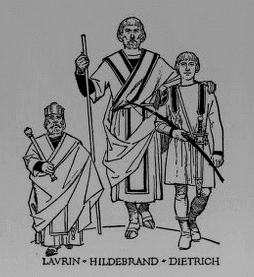
The Middle High German heroic epic of Dietrich has come down to us in at least eighteen manuscripts from the beginning of the 14th to the beginning of the 16th century and eleven papers from 1479 to 1590. There is also a Czech manuscript from 1472 and a Danish adaptation.
There are five versions based on content and form:
- older Vulgate version (basic story)
- Younger Vulgate version (with a history of the kidnapping of Dietleib’s sister)
- Walberan version (link to another story about the dwarf king Walberan)
- Dresdner Laurin (content like the older Vulgate, but stanzas in Heunenweise. All other versions in pairs of rhymes.)
- Pressburger Laurin (only a fragment until Dietrich set out for the rose garden, rather parodic description).
An essential difference between the versions can be seen in the assessment of the conflicting parties: Laurin’s party is increasingly negatively identified, so that the completely unjustified destruction of the rose garden by Wittich and Dietrich takes a back seat.
An exception is the Walberan version, in which the dwarf party is portrayed as just, mild and chivalrous.
Legendary Dietrich von Bern
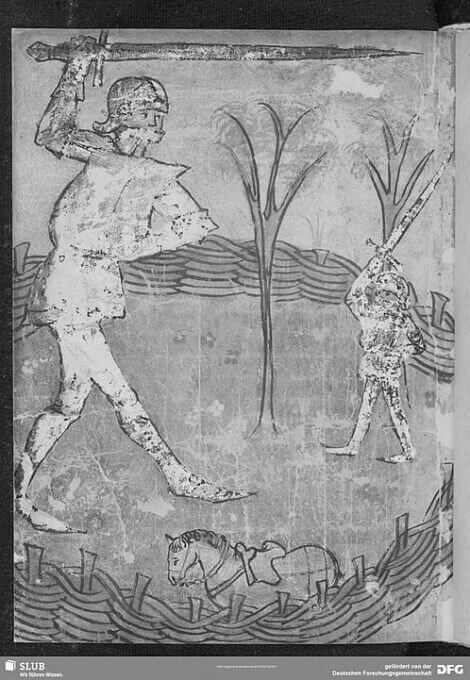
The German legends of Dietrich von Bern are known through literary sources – epic poems about him, the Old Norse Thidrekssaga (itself drawn from German material), mentions of the character in the Nibelungenlied (best known through Wagner’s operatic adaptation, in which Dietrich also appears), and a few other sources.
But the differences between these, and their distance from the historical characters on whom the legends are very probably based, make it clear that there was a widespread oral mythos surrounding Dietrich long before they were committed to paper. Minnesänger or minstrels would spread the tale across the courts.
Dietrich von Bern originated as a legendary version of the Ostrogothic king Theodoric the Great. In the legends, Dietrich is a king ruling from Verona (Bern) who was forced into exile by his evil uncle Ermenrich.
In exile, Dietrich has a great many adventures; in most of the surviving material, these are quite fantastical in nature and include battles with dragons and other beasts of myth.
At some point in the process, he arrives at the court of a king named Etzel (Attila), and either swears fealty to him or arranges an alliance; Etzel’s army then conquers Bern and restores Dietrich to his throne in Italy.
The differences between the known life of Theodoric and the picture of Dietrich in the surviving legends are usually attributed to a long-standing oral tradition that continued into the sixteenth century.

Most notably, Theodoric was an invader rather than the rightful king of Italy and was born shortly after the death of Attila and a hundred years after the death of the historical Gothic king Ermanaric.
Many of the fantastic poems show a close relationship to South Tyrol, and connection between them and Tyrolean folklore are often speculated upon.
Dietrichs stories are popular in South Tyrol, the setting for many of the legends. In particular, the legend of King Laurin has continued to be important here, with the Rosengarten group of mountains associated with the legend.
Version II
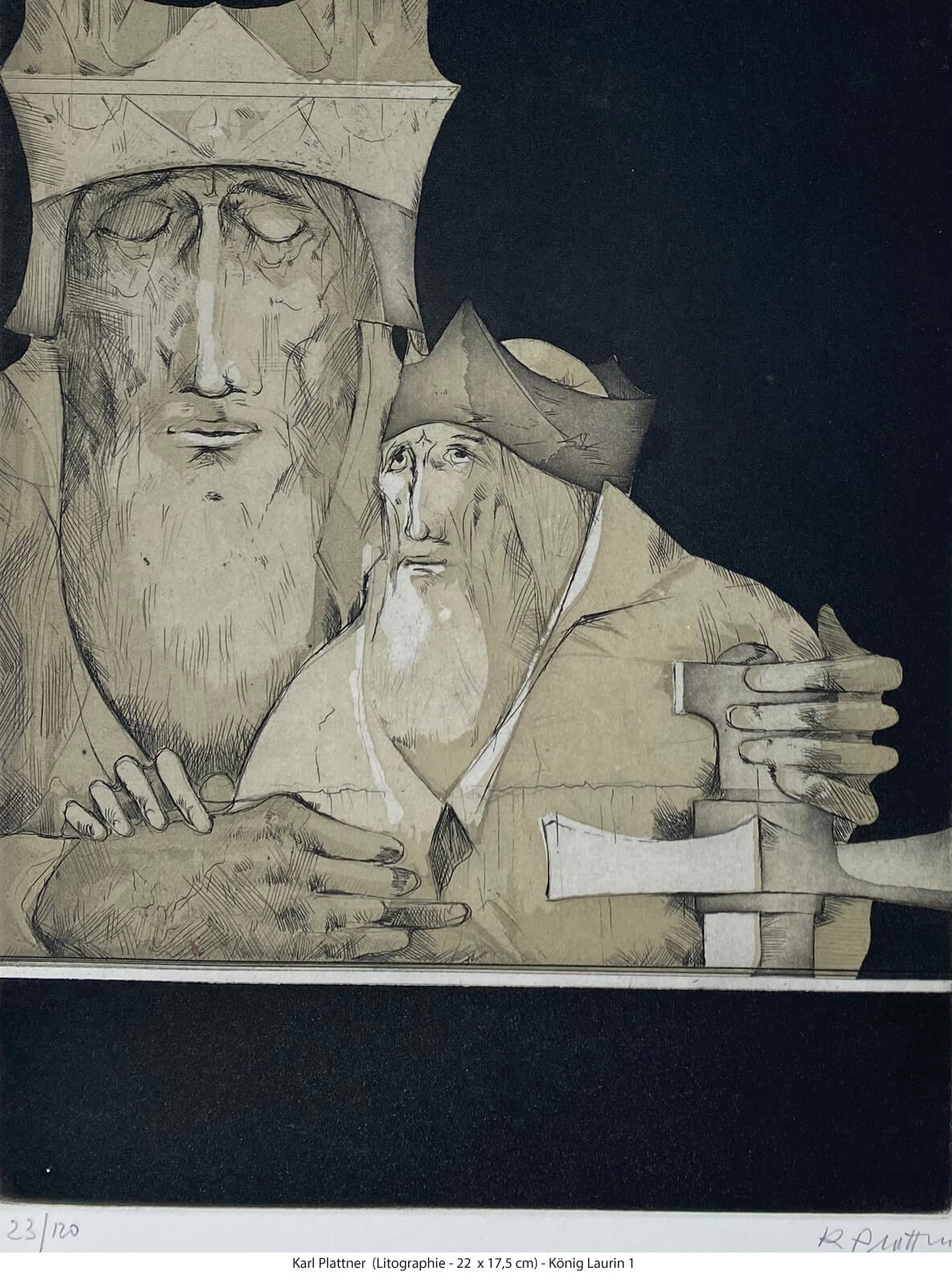
The Legend of King Laurins Rose Garden – The Wonderful Rose Garden
The Wonderful Rose Garden
Dietleib the Dane-How he became a Knight-Kunhild stolen by the Dwarf King-Knights to the Rescue-The Garden laid waste-Laurin’s Vengeance-Witege overcome-Combat with Prince-The Invisible Combatant-Laurin is spared-Visit to Mountain Dwelling-The Banquet-Knights made Prisoners-Dietrich’s Fiery Breath-Battle with Dwarfs and Giants-The End of Strife.
FIRST be it told of the lady Kunhild’s brother, Dietleib the Dane. He had fame in his own land for strength and prowess, and great and glorious were the deeds of his sire, the brave Yarl Biterolf. It chanced that when the three journeyed towards Bern they were set upon by Heime and his robber band in the midst of a forest. Boldly fought the Danes, and the robbers were all killed, save Heime alone, whom Dietleib, with his sword Welsung, wounded on the forehead and put to flight.
Thereafter the young Dane became a servant unto Dietrich, making pretence that his name was Ilmenrik. It chanced that the prince paid visit to the Court of Ermenrich, and there was his Danish servant taunted by Walter of Wasgenstein. Dietleib was wroth, and he challenged the arrogant knight, wagering life against life, to prevail against him in performing feats of strength. All the Court assembled to behold the sport, and the knight was boastful and proud. But great was the might of Dietleib the Dane. He could putt the stone and throw the hammer so that men marvelled to behold, nor could Walter of Wasgenstein prevail against him.
Then did King Ermenrich pay life ransom in money for the boastful knight, and the Dane gave a great feast to which his master did invite many valorous war men.
Proud was Dietrich of his servant, and he made him a knight. Heime, who had returned, was present at the feast, and Dietleib sat beside him, and ere long he spake, saying:
“On thy forehead is an evil scar, Heime. How came thou by it?”
Heime made answer: “I shall tell thee in secret, Ilmenrik. Wounded was I in combat with Dietleib the Dane. I shall rest not until my shame be wiped out with his life blood.”
“Know then,” the new knight whispered, “that I am he whom thou didst attack with thy robber band. Look in my face. . . . I am no other than Dietleib. Fast was thy horse, else thou hadst not escaped me. But I seek not now to denounce thee before Dietrich. Let this secret be kept between us.”
It chanced upon a day thereafter that fair Kunhild, Dietleib’s sister, danced with her maids upon a green meadow. She went towards a linden tree; then suddenly she vanished from sight. The King of Dwarfs, whose name was Laurin, had long loved her for her beauty, and desired to have her for his bride. So he came secretly towards the maiden, and below the linden tree he cast over her his Cloak of Obscurity; then did he carry fair Kunhild away towards his castle among the Tyrolese mountains.
The heart of Dietleib was filled with sorrow, because that he loved his sister very dearly. He hastened unto Hildebrand, who dwelt in his castle at Garda, and besought his aid, saying:
“The castle of Laurin is in the midst of a Tyrol mountain, and in front of it he hath a wondrous Rose garden.”
Many a life may be lost ere Kunhild is rescued,
Hildebrand said; “but let us unto Dietrich and his knights, so that we may take counsel with them.”
When that the knights came to know that Kunhild was taken away by the dwarf king, Wolfhart spake boldly, as was his wont, and said:
“Alone shall I ride forth and rescue this fair maid.”
Dietrich heard the boast, nor made answer. He spake to wise old Hildebrand, saying: “Knowest thou aught of Laurin’s Rose garden?”
“‘Tis told,” Hildebrand said, “that it hath four gates of gold. But no wall shields it. Round the Rose garden is drawn a silken thread, and he who breaks it shall have his right hand and left foot cut off. Laurin, King of Dwarfs, ever keeps watch o’er his wondrous garden, which is of exceeding great beauty.”
Witege spake: “Laurin can punish not an offender who entereth his garden until he doth prevail against him in single combat.”
“Then shall we fare forth,” Dietrich said. “We seek but Kunhild, and need not despoil the Rose garden.”
So the Prince rode towards the Tyrol mountain in which Laurin, King of Dwarfs, had his dwelling. With him went Hildebrand, Heribrand’s son; Witege, Wieland’s son; Dietleib the Dane, and Wolfhart, Hildebrand’s kinsman.
Dietrich and Witege rode in front, because that Hildebrand had taunted the prince, as was his wont, for he had been his master. “Were I not with thee,” he said, “thou couldst not overcome the dwarf.”
So it fell that Dietrich and Wieland’s son were first to reach the wondrous Rose garden. Witege broke to pieces a golden gate, and they entered together. Fair were the roses, and of sweet and refreshing fragrance; their beauty gladdened Dietrich’s eyes, and he was loath to despoil them. But Witege sought to defy the dwarf, and he rode through the blossoming shrubs, trampling them ruthlessly underfoot. Soon was the fair garden made desolate as a wilderness.
Wroth was Laurin, King of the Dwarfs. He rode forth on his steed, clad in full armour; his spear was in his hand. But three spans high was he, yet had he wondrous strength and skill in conflict.
“What evil have I done thee that thou shouldst thus destroy my roses?” he cried bitterly. “Thy right hand and thy left foot I now demand, and must needs obtain.”
Witege defied the dwarf with laughter and scorn. He deemed not that he was endowed with magical power. Diamonds sparkled upon Laurin’s armour; these made it swordproof and spearproof. He also wore a girdle which gave him the strength of twelve men. On his head was a shining crown, and therein was his weakness. Golden birds sang forth from it as if they were alive.
Witege lowered his spear. Laurin charged fiercely, and at the first thrust swept him from the saddle. In great peril was Wieland’s son, for the dwarf bound him; but Dietrich made offer of gold to atone the evil he had done.
“Thy roses,” he told Laurin, “will bloom again in May.”
The dwarf made answer that he possessed already gold in abundance, but that his roses could not be restored unto him.
Witege taunted Dietrich. “Fearest thou to tilt with him?” he said; “must I die because thou dost shrink from Laurin?”
The prince was wroth, and he challenged the dwarf king forthwith to single combat, taking upon himself the blame for the evil which his knight had accomplished.
‘Twas well for Dietrich that old Hildebrand then rode up with Wolfhart, his kinsman, and Dietleib the Dane. The old warrior counselled the prince to tilt not with the dwarf. “Rather shouldst thou fight him on foot with sword against sword,” he said. “His armour thou canst not pierce, for by reason of the diamonds it is charmed against all weapons. Smite thou him upon the head.”
As Hildebrand counselled, so did Dietrich do. He leapt from the saddle and challenged Laurin to combat with swords. Fierce was the conflict. The prince smote upon the dwarf’s head blow after blow, so that he was made faint. But Laurin drew round him his Cloak of Obscurity and fought then unbeholden by the Prince of Bern.
Many wounds did Dietrich receive; but he waxed in battle fury and suddenly took the unseen dwarf in his arms and wrestled with him. From the prince’s mouth issued forth flames of fire, but without avail; he could not injure Laurin.
“Snatch off his waist girdle,” Hildebrand cried.
Ere long Dietrich possessed himself of the magic girdle, which gave to the dwarf his great strength. Then the prince had him in his power. He cast the little king on the ground and tore off the Cloak of Obscurity.
Laurin feared that he would be put to death, so he called upon Dietleib, Kunhild’s brother, who pleaded for his life, for the young Dane desired most of all to discover where his fair sister was held in captivity. Thus did the dwarf king escape the vengeance of Dietrich. He gave thanks unto Dietleib, and when he had sworn oaths of brotherhood with him, he invited the prince and all his knights into his mountain castle.
They went together over a pleasant plain, and through a fair forest. A great linden tree was there, and many fruit trees whose odours were sweet. Birds sang merrily in the branches, and Dietrich was glad of heart. He began to make answer to the birds; but old Hildebrand warned him not to whistle until he had left the wood. All the knights were lighthearted save Witege. He had bitter memory of how the dwarf had prevailed against him, and suspected treachery. Wolfhart taunted him, but Wieland’s son rode in front. He was first to reach the castle entrance. He saw there a bright golden horn suspended on a chain. He blew a loud blast upon it. When he did that the door opened wide and they all went within. An iron door was opened; it closed behind them. Then through a door of shining gold they went; it was shut fast like to the other.
Soon Dietrich and his knights found themselves in a bright and spacious hall. Hundreds of dwarfs were there. They made merry; they danced and they held tournaments. Delicious wine was given unto the strangers, and even Witege forgot to be suspicious, and made merry with the others. Then did Laurin begin to work his evil designs. He cast a spell upon Dietrich and his knights, so that they could behold not one another. They saw but the merry dwarfs and the glories of the mountain dwelling.
At length fair Kunhild appeared. She had been made Laurin’s queen, and wore a gleaming crown. Many maidens came with her, but she was fairest of them all. Dwarfs playing harps, and dancing and performing strange feats, skipped before her and around. In her crown shone a bright jewel. It dispelled the magic mist, and the warriors beheld one another again.
Then was a great feast held. Kunhild sat with Laurin, and Dietleib, whom she embraced tenderly, she took beside her. They spoke in low voices one to another. Great was her desire to leave all the splendour and wealth that was there, and return once again to her own kin.
The dwarf persuaded all the knights to lay down their arms. So merry were they that they did so without fear.
Evening came on, and Laurin led Dietleib to a chamber apart, where he made offer to him of rich treasure if he would desert Dietrich and his knights. But the young Dane refused resolutely to be a traitor, whereat the dwarf vanished and the door was locked securely. Dietleib was made blind.
Then were the strangers given wine, which caused them all to fall into a deep sleep. The vengeful king Laurin thus had them in his power. He caused them to be bound, and they were all cast together into a deep dungeon, so that vengeance might be wreaked upon them, because that the Rose garden had been despoiled. There they lay helpless and blind.
Kunhild wept for them. When the dwarfs were all asleep she stole in secret to her brother’s chamber and gave to him a golden ring which dispelled his magic blindness. Then did the young Dane secure possession of his weapons and those of his fellow knights.
Meanwhile Dietrich woke up. Wroth was he when he found that he was fettered. The dwarf’s girdle restored his sight, and flames issued from his mouth, which melted his bonds of iron, so that he rose up. He went towards each of his companions and set them free one by one.
Dietleib then came with all their weapons, and with the prince he fought fiercely against the dwarfs. At length Dietrich wrenched from one of them a golden ring. He gave it unto Hildebrand, and his sight was restored. Then did the old warrior enter the conflict. The dwarfs fell fast before them. Thousands were put to death, for there was none in Laurin’s castle who could prevail against the three great warriors.
At length Laurin rushed without. He blew a great blast upon his horn, and five giants armed with clubs came to his aid.
Wolfhart and Witege were still blind, but they could rest not while the clamour of battle raged about them, so they rushed into the fray and fought bravely. Then gave Kunhild unto them jewelled rings, and their blindness was dispelled.
The five giants fought against the five knights, and long and terrible was the struggle which ensued; but one by one the monsters were slain, and Dietrich and his knights were triumphant. The heroes waded knee deep in blood, so great was the slaughter which they accomplished in the kingdom of Laurin.
Then was the dwarf king made prisoner and Kunhild set free. Dietrich and his knights possessed themselves of much treasure, and they returned unto Bern, taking with them Laurin and Dietleib’s fair sister.
Laurin was laughed at and put to shame, and he brooded over his evil lot, desiring greatly to be avenged upon Dietrich and his victorious knights. So he sent a secret message unto his uncle, Walberan, who was king over the giants and dwarfs in the eastern Caucasus, and besought him to come to his rescue.
He spoke secretly thereanent unto Kunhild, whereat she made promise that if he swore oaths of friendship with Dietrich, she would return with him to his mountain dwelling and be his queen once again.
So she prevailed upon Laurin to do her will. “My Rose garden”, he said, “I shall plant again that the roses may bloom fair and fragrant in the sunshine of May.”
The dwarf king drank wine with the prince of Bern and made peace, vowing to be his lifelong comrade and helper.
As they sat together at the feast, a message was borne unto Dietrich from King Walberan, demanding all the treasure and all the weapons that were in Bern, and the right hand and left foot of every knight who had wrought destruction in the Rose garden. Defiantly did the prince make answer and prepared for battle.
Dietrich and Walberan challenged each other to single combat, and they fought with great fierceness. Numerous were their wounds, nor could one prevail over the other. It seemed as if they would both be slain.
Then did King Laurin ride forth, and, embracing his uncle, he prevailed upon him to make peace. Hildebrand pleaded likewise with Dietrich, and the combat was brought to an end. Together they then sat down to feast and drink wine, and they vowed oaths of friendship, so that there might be lasting peace between them.
Kunhild returned with Laurin unto his mountain dwelling. The Rose garden was planted once again, and it bloomed fair in the sunshine of May.
Herdsmen among the hills, and huntsmen who wend thither, have been wont to tell that they could behold on moonlight nights Laurin and fair Kunhild dancing together in the green forests and in the valleys below the Tyrolese mountains. Dietleib’s sister hath still her dwelling in the bright castle as in other days. She is Queen of the Dwarfs and can never die.
The Rose garden blooms ever fair, but unbeholden by men, in the sunshine of May, and many have sought to find it in vain.
Mackenzie Donald A. Teutonic Myth and Legend. An Introduction to the Eddas & Sagas, Beowulf, The Nibelungenlied, etc. London. 1912.
The Legend of King Laurins Rose Garden – Short version of the legend from menu of Laurin Bar & Bistro in German, Italian and English

Discovering the Dolomites on foot
The Dolomites do not only impress because of the pale mountains, but mainly because of their varied landscape:

Wild alpine meadows, deciduous and evergreen woods, lunar landscapes, high altitude terrain, alpine lakes, soaring peaks, dramatic walls, and towering heights. The Pale Mountains feature an infinite number of trails winding their way through these wild landscapes, with breathtaking views adding to the dramatic scenary. We know the Alps well, and were able to visit some of the most incredible areas in the Dolomites by motorbike, and of course – on foot.
The Dolomites are a paradise for outdoors lovers, renowned for skiing in the winter months and for mountain climbing, hiking, motorbiking, cycling in all other seasons. Everything from easy nature strolls to moderate day hikes to hard-core mountaineering, climbing rocks and glaciers – the Dolomite Mountains offer them all and we suffered them as sweating survivors – not fun
But as well as trained hikers with proper gear, preparation and deep respect for the mountains – big fun.
Climbing to the top of the mountain is fun, but everything is just downhill from there…
The Three Languages of South Tyrol
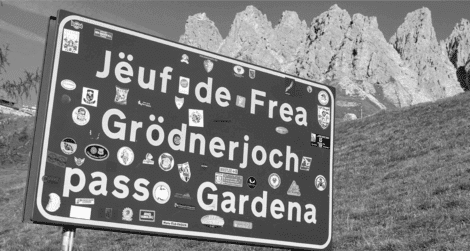
Culturally speaking South Tyrol is a fascinating border region between the Austro – Germanic linguistic area to the north and the Italian speaking southern section with three different linguistic groups peacefully cohabiting – the German-speaking South Tyroleans, the Italian speaking residents and the Ladins, a linguistic minority group speaking a language based on the Latin spoken by the peoples of the area during and shortly after the Roman occupation of the Dolomites.
Italian, is the national language of Italy. Most italians live in the captital of South Tyrol, Bozen, Bolzano or Bulsan.
German is an official language in the Province of Bolzano spoken by 314,604 (census 2011) people. A majority of these people use native Austro-Bavarian dialects of the German language, the Tyrolean, in every day’s life. Standard German plays a dominant role in education and media.

Ladin is officially recognised in Trentino and South Tyrol by provincial and national law. About 20,000 people in the Dolomites still speak Ladin today, in the 5 Ladin valleys: Val Gardena, Alta Badia, Cortina d’Ampezzo, Fodom and Val di Fassa. Ladin is recognized as a minority language in 54 Italian municipalities belonging to the provinces of South Tyrol, Trentino and Belluno.
Come visit the Dolomites
Komm, besuche die Dolomiten
Vieni a visitare le Dolomiti
Vieni a visitar le Dolomites
~ ○ ~
Keep exploring:
Keep exploring:
Works Cited & Multimedia Sources
- Das büechlin saget von dem rosengarten künig Laurin (1500 printing, Strasbourg)
- Dolomitiunesco: https://www.dolomitiunesco.it/en/sciliar-catinaccio-latemar/
- Dresden, State Library, Mscr. M 201, The Dresden Heldenbuch (MS L11)
- Frescos of the Laurin legend in Bolzano. https://vimeo.com/37964917
- https://de.wikipedia.org/wiki/K%C3%B6nig_Laurins_Rosengarten
- https://de.wikipedia.org/wiki/Rosengartengruppe
- https://de.zxc.wiki/wiki/K%C3%B6nig_Laurins_Rosengarten
- https://en.wikipedia.org/wiki/Dietrich_von_Bern
- https://en.wikipedia.org/wiki/Laurin_%28poem%29
- https://folkhistory.blogspot.com/2014/01/dietrich-von-bern.html
- Mackenzie Donald A. Teutonic Myth and Legend. An Introduction to the Eddas & Sagas, Beowulf, The Nibelungenlied, etc. London. 1912. https://earth-history.com/Europe/Teutonic/chap39.htm
- Pictures Wiki common
- Sagen.at – King Laurin: http://www.sagen.at/texte/sagen/italien/legends_in_english/kinglaurin.html
- Sawyer, Ruth. Dietrich of Berne and the dwarf king Laurin; hero tales of the Austrian Tirol.1963. https://archive.org/details/dietrichofberned00sawy/page/n9/mode/2up?q=laurin
- The Wonderful Rose Garden. https://www.sacred-texts.com/neu/tml/tml44.htm
- Wolff Karl Felix. The Pale Mountains. Legends of the Dolomites.1989.
- www.laurin.it We spend our 10th anniversary here where we saw the frescos of the Laurin legend in the bar.
- Wolff Karls Felix. Dolomitensagen. Sagen und Überlieferungen, Märchen und Erzählungen der ladinischen und deutschen Dolomitenbewohner.1989.
- Mahlknecht Bruno. Südtiroler Sagen.1981.
- Wolff Carlo Felice. Leggende delle Dolomiti. I monti pallidi. 1989.

